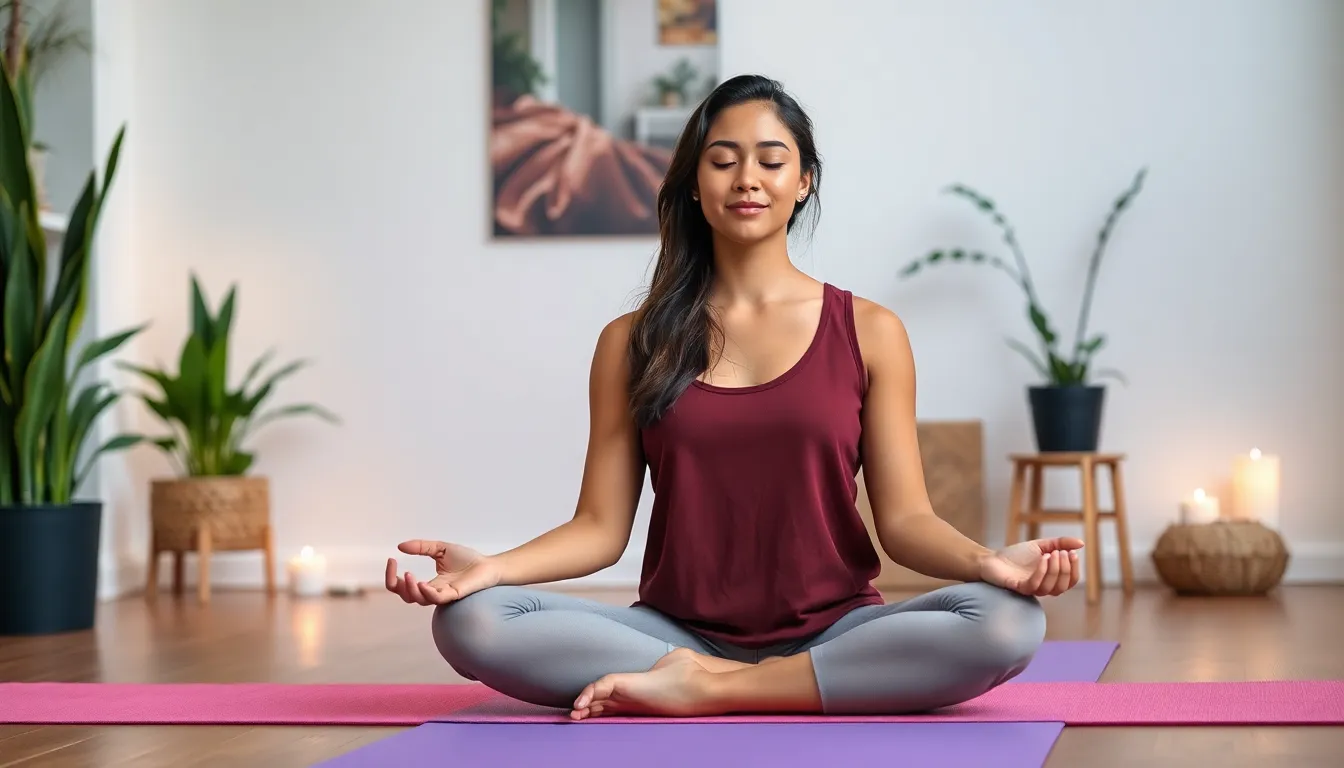In a world buzzing with notifications and endless to-do lists, young adults often find themselves in a whirlwind of stress and distraction. Enter meditation—the superhero of mental wellness that doesn’t require a cape. Imagine trading in anxiety for calm, and chaos for clarity, all while sitting cross-legged and sipping herbal tea. Sounds dreamy, right?
Meditation isn’t just for monks in remote monasteries anymore. It’s a practical tool for today’s hustle culture, offering a slice of peace amidst the madness. Young adults are discovering that taking a few minutes to breathe can transform their day from “meh” to magnificent. So why not join the ranks of those who’ve unlocked their inner zen? It’s time to embrace the art of stillness and let meditation work its magic.
Table of Contents
ToggleOverview of Young Adults Meditation
Meditation offers young adults a means to cope with the stress and distractions prevalent in modern life. Many experience heightened anxiety due to academic pressures and social expectations. Practicing meditation fosters mental clarity and emotional resilience, enabling individuals to navigate daily challenges with greater ease.
Daily meditation practices enhance self-awareness, helping them develop a deeper understanding of their thoughts and emotions. Regular engagement can lead to improved focus, making it easier to concentrate on tasks at hand. Many techniques, such as mindfulness meditation and guided imagery, cater specifically to the needs of young adults, allowing them to find a practice that resonates.
Studies indicate that meditation can reduce symptoms of anxiety and depression, fostering a sense of well-being. Incorporating meditation into a daily routine requires only a few minutes per session, making it accessible for busy lifestyles. Resources, like mobile apps and online courses, provide structured guidance to facilitate the learning process.
Practitioners report experiencing increased levels of happiness and satisfaction in their lives. Community support further enriches the meditation experience, promoting group practices or online forums for shared learning. Young adults benefit greatly from connecting with others who value the art of meditation and cultivate a similar quest for inner peace.
Meditation aligns perfectly with the desire for personal growth many young adults seek. By embracing this practice, individuals empower themselves to create calmer, more balanced lives amid the chaos of their environments.
Benefits of Meditation for Young Adults

Meditation offers numerous advantages for young adults seeking to enhance their well-being. This practice serves as a vital resource for improving mental health and focus.
Mental Health Improvements
Meditation significantly reduces anxiety and depression symptoms in young adults. Research indicates that regular practice leads to lower cortisol levels, resulting in decreased stress. Individuals experience improved emotional resilience, allowing them to manage overwhelming feelings more effectively. With time, they develop healthier coping mechanisms to handle academic and social pressures. Many report enhanced self-awareness, leading to greater fulfillment and satisfaction in daily life. This transformative effect fosters a positive mindset, empowering young adults to face challenges with confidence.
Enhanced Focus and Clarity
Clarity of thought enhances greatly through meditation. Engaging in mindfulness techniques sharpens concentration, enabling young adults to remain present in their tasks. Numerous studies highlight improved cognitive function, contributing to better academic performance. Practicing meditation helps individuals break free from distractions, promoting greater productivity. Enhanced focus leads to a more organized approach to responsibilities, reducing procrastination. Deepened awareness encourages effective decision-making, allowing young adults to navigate complex situations with ease. This mental clarity is invaluable in today’s fast-paced environment, where maintaining attention is essential.
Different Types of Meditation Practices
Meditation includes various practices that cater to the needs of young adults. Each type offers unique benefits for mental clarity and emotional well-being.
Mindfulness Meditation
Mindfulness meditation emphasizes present moment awareness. Practitioners focus on their thoughts, feelings, and bodily sensations without judgment. Research indicates that this type of meditation enhances self-awareness, allowing individuals to observe their reactions to stressors. Regular practice can lead to reduced anxiety and improved emotional regulation. Busy young adults benefit from the simplicity of mindfulness, which can be integrated into daily routines, like while commuting or during study breaks. Engaging in mindfulness can foster resilience and create a sense of calm amidst life’s challenges.
Guided Visualization
Guided visualization helps individuals create mental images to promote relaxation. Participants often follow a facilitator’s narration that leads them through peaceful scenarios. This technique encourages the mind to envision serene places, which reduces stress. Young adults managing academic pressures often find guided visualization highly effective for escaping overwhelming thoughts. The practice also fosters creativity and inspiration by enabling deeper mental exploration. Additionally, it supports goal-setting by allowing individuals to visualize their aspirations.
Transcendental Meditation
Transcendental meditation involves silently repeating a mantra to achieve mental stillness. This simple technique typically requires two sessions of 20 minutes each day. Studies show that it significantly lowers stress and enhances cognitive function. Young adults may appreciate this practice’s straightforwardness, which suits busy lifestyles. It fosters a deep sense of inner peace and promotes emotional stability. Regular engagement leads to improved focus and productivity, essential for academic success. Utilizing transcendental meditation can empower individuals to cultivate a more balanced life.
How to Get Started with Meditation
Starting meditation involves creating a conducive environment and establishing a consistent practice. Young adults can enhance their experience and reap greater benefits by following specific steps.
Setting Up a Meditation Space
Designing a meditation space fosters relaxation and focus. Choose a quiet area free from distractions. Incorporate comfortable seating like cushions or chairs. Personalize the space with calming elements, such as plants or soft lighting. Use essential oils or incense to enhance the atmosphere. Organizing the meditation tools, like journals or meditation apps, also encourages regular practice. Ensure that this space represents peace and tranquility, making it inviting for daily use.
Creating a Daily Routine
Establishing a daily routine enhances the effectiveness of meditation. Attempt to meditate at the same time each day to increase consistency. Incorporating short sessions of 5 to 10 minutes helps beginners. Gradually extend meditation duration as comfort grows. Pair meditation with daily activities such as morning routines or lunch breaks for easy integration. Use reminders or meditation apps to stay accountable. Regular practice cultivates discipline and deepens the overall meditation experience.
Challenges Young Adults Face in Meditation
Young adults encounter several challenges when integrating meditation into their daily lives. Distractions from technology and busy schedules often impede focus.
Common Obstacles
Time constraints hinder consistent practice for many. They often struggle to carve out moments for meditation amid demanding academic and work commitments. Moreover, a wandering mind complicates efforts to maintain concentration during sessions. Young adults frequently find it hard to silence their thoughts, which detracts from the overall experience. Lastly, unrealistic expectations can arise, leading to frustration when immediate results don’t materialize.
Tips for Overcoming Challenges
Establishing a set routine creates stability in practice, helping young adults prioritize meditation. Setting short sessions of 5 to 10 minutes allows for gradual acclimatization. Engaging in guided meditations can enhance focus and effectiveness for beginners. Choosing a dedicated meditation space fosters a relaxing atmosphere, encouraging mindfulness. Joining a community, whether online or in-person, provides support and a sense of accountability, making the practice less isolating.
Meditation offers young adults a transformative path to mental wellness in an increasingly demanding world. By embracing this practice, they can cultivate a sense of calm and clarity amidst the chaos. With various techniques available, meditation becomes an accessible tool for enhancing focus and emotional resilience.
Establishing a routine and creating a supportive environment can significantly improve the meditation experience. As young adults navigate academic pressures and social expectations, integrating meditation into their daily lives can lead to profound changes in their overall well-being. Prioritizing mental health through meditation not only fosters personal growth but also strengthens connections within supportive communities.



